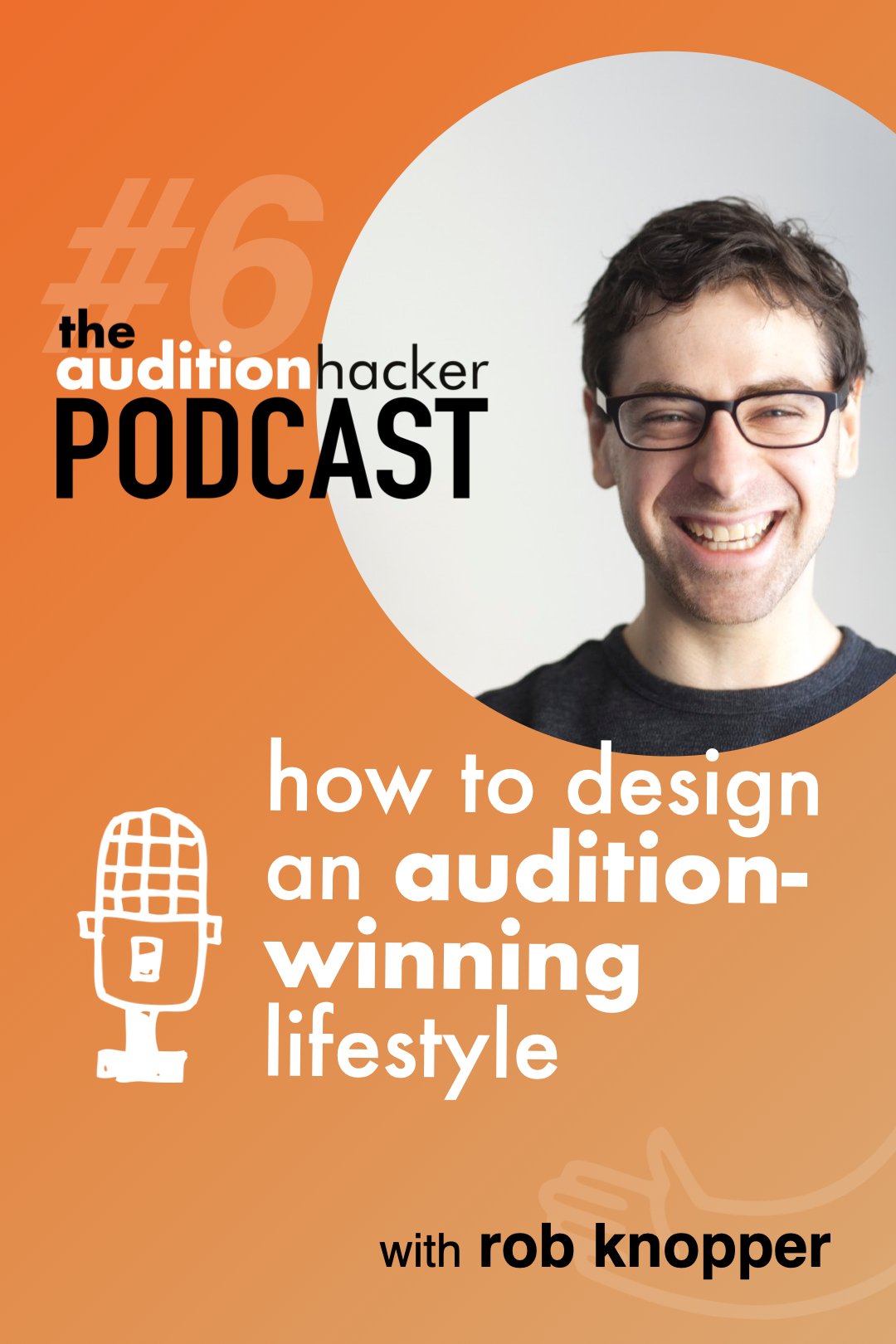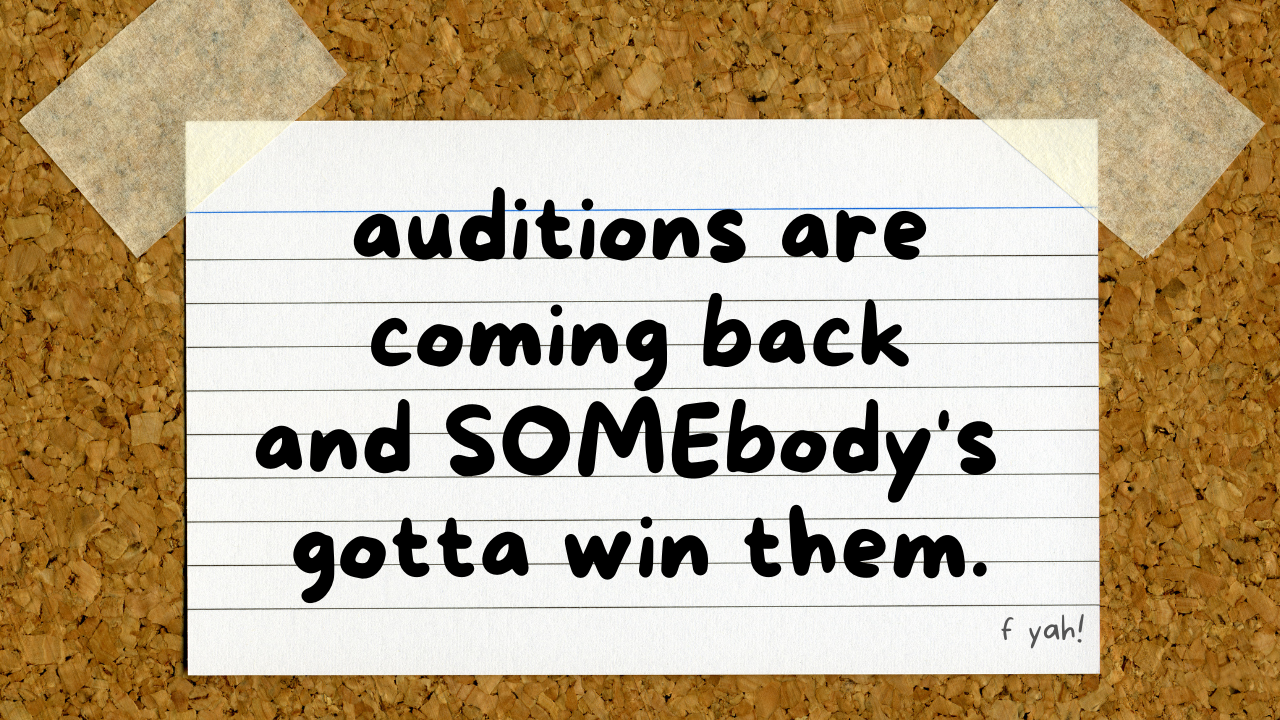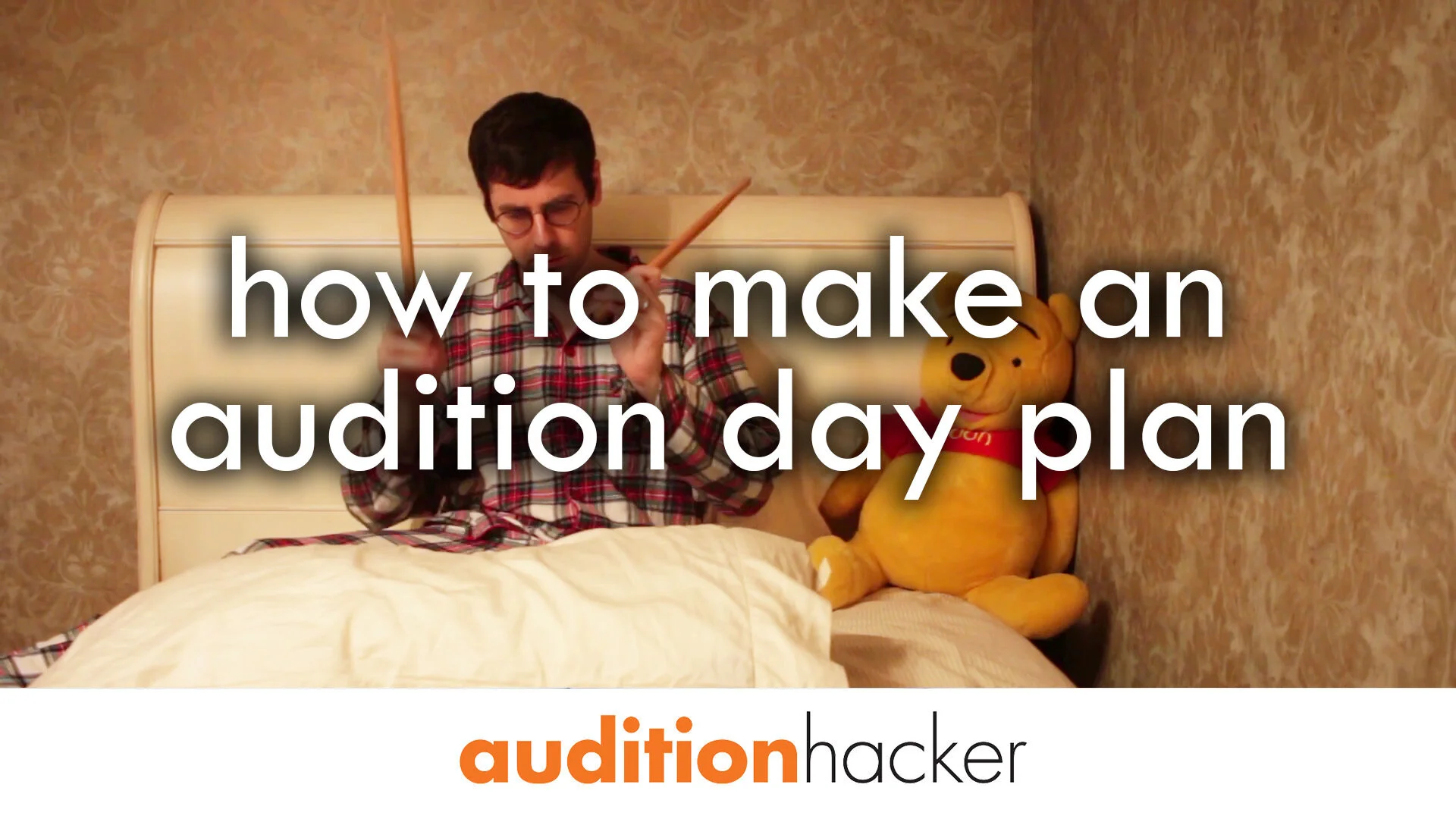hey y'all.
so, out of all the audition topics i am super unqualified to talk about, how to pay your way through an audition process is at the top of the list.
i am a notorious gig-turn-downer. i still am. it's a luxury that i know not everyone has. however, lots of you have asked me how to make enough money to keep afloat during auditions.
the good news is that my man seth hanes, from the musician's guide to hustling, is a truly talented guy when it comes to creating a network in a new city and getting some gigs out of it. he wrote about how to pay for your next audition. woohoo! here ya go:
I know, you might have read the title of this article and cringed a little bit.
"But I don't want to be a freelancer!"
This isn't about how to become a full-time freelancer. This is about having the option to take as much (or little) freelance work as you need to cover your audition expenses.
Let's face it: auditions cost money. There's no way around it.
If you are serious about pursuing auditions, then you are going to have to pay for things like travel, housing, and food.
"But won't freelancing take away time from my audition prep?"
Yes, but as someone who spent the first few years of my musical career working in a parking garage, I can tell you that freelancing definitely isn't the worst way to earn some extra cash to cover your expenses.
Ready to get started?
The real cost of taking auditions
For the sake of this article, let's look at the costs of an actual audition. In this case, I chose to use the second trumpet audition for the Charlotte Symphony taking place in November 2016 as the example. We will talk about how to actually pick up extra freelance work later, but the first thing you need to do is to understand the real costs of auditions.
Once you understand the costs, you can work backwards from the total to figure out how much you need to account for. Everyone's situation will be different depending on your instrument, location, and other details, but generally speaking, you can always expect to have expenses like travel, housing, food, etc.
Since I'm coming from Philadelphia, I decided to break down the actual costs of taking this trip.
Flight - $166
AirBNB - $180
Food - $75
Uber to airports - $60
Grab an Uber fare estimate here
Misc. - $50
Total: $531
Philadelphia to Charlotte happens to be a fairly cheap flight so that works out well for this example, but a quick Google search for flights can give you a good idea about how much that travel will cost.
It took me about 15 minutes on AirBNB to find a cheap place to stay that was walking distance from the hall. Since there are two days of auditions, I decided to book a room for a couple of nights in case I made finals.
Food is one of those items that people don't really budget for, but when you're eating out for several meals, it adds up fast.
Don't forget about any transportation expenses to get back and forth from the airport, either. In this case, I got some estimates from Uber just to keep it simple.
And last but not least, don't forget to factor in a little bit for miscellaneous expenses that inevitably pop up. Win or lose, you might just want a drink at the local bar after the audition is over.
Most people never even bother to figure out how much auditions are going to cost them in advance. By doing this, you can figure out exactly how much freelance work you need to pick up to fund your next audition.
The questions of whether or not it will take up too much of your time will go out the window because you can set a clear goal for how much work is necessary to cover your expenses.
How to pick up extra freelance work
OK, we now have a good idea of how much our theoretical audition will cost. Let's talk about how to actually pick up freelance work to cover those costs.
Our goal is to make about $500, and whether or not you like the idea of freelancing while taking auditions, I think we can agree that it won't take that many gigs to cover our costs.
Earning $500 is the equivalent of one really solid gig or a handful of smaller gigs. Now, I know what you're thinking: where do these extra gigs come from??
Unless you're already an in-demand freelancer, work isn't likely to be falling from the sky. There are, however, several ways that you can drum up some extra work if and when you decided to do so.
the article continues below...
want a head start on audition preparation?
here's my 5-step guide to constructing your preparation process and optimizing it for maximum results.
Use your natural network
One of the simplest ways to start picking up extra work is to talk to the people in your natural network. Your natural network is the people that you naturally know and have a relationship with. This could be your fellow freelancers in town, teachers, friends, or anyone else that might be able to point you in the right direction when trying to pick up a few gigs.
Whether you are just letting them know that you're interested in picking up some extra work or just want to ask for their advice, many people will be surprised at how effective this can be. Anyone that you have an existing relationship with will likely want to help you succeed if they can.
This is not a hard sell.
Your goal should be to just let them know that you're looking for a few extra gigs and that you would appreciate if they had any thoughts they might be willing to share.
That's it.
Remember, don't go about this in an overly-salesy way because they won't respond well to that.
Reach out to those that might be hiring
Now that you've made contact with your existing connections, you can start focusing on meeting the people in your area that might be hiring for your instrument. This might sound a little forward, but I want to share exactly how to do this in an authentic way that won't come off as annoying.
Whether you're a string player who wants to pick up some wedding gigs on the side or a percussionist who wants to sub with local orchestras, the first thing that you need to do is get to know the people that do the hiring.
First, you need to do a little research about what these opportunities might be for you and compile a list of the contractors that are in charge of rosters. Remember, there is n o way that they will hire you if they don't know you exist, so don't be shy about introducing yourself.
The easiest part of getting started freelancing is compiling a list of emails; the hard part is knowing what to say that will get your foot in the door.
OK, so you might be thinking: this sounds great, but what do I actually say?
A few years ago, I created a template for myself that has led to countless freelance opportunities, and in the spirit of making this as actionable as possible, I want to share it with you.
All you have to do is swap out the bolded information below with your own:
Hi their name.
My name is your name, and I'm a local instrument you play.
I just wanted to reach out and let you know that should you ever need your service offering, I'm available and would love to play.
I have performed with group, group, and group around the area and would love the opportunity to work together sometime.
For your convenience, I've attached my resume and/or recording/website.
Thanks for your time, and I hope to hear from you soon!
-Your name
This script is short and to the point. Here's the quick outline of why it works:
Friendly intro. Tell them exactly who you are and what you've got to offer.
Provide value. Remember earlier when you figured out who's hiring? If you chose correctly, this email should be very relevant to them and they'll likely welcome having your information. They've got a problem to solve and you're providing a solution.
Social proof. People don't need tons of proof to know you're legit. Just give them a quick glimpse so they know what you're doing.
Make it easy for them. Give them everything they need in one place. Do the work for them by providing them your recordings, resume, website, or whatever it is that will help them with their decision if they need more proof.
Thank them for their time. People are busy and NOBODY wants more email. Make sure to thank them for their tie and give a little nudge that you would like to connect.
Just like before, you never want to come off as presumptuous or salesy. Instead, your goal should just be to get on their radar so that whenever the opportunity pops up, they just might hire you. By sticking to this script and reaching out to the people that might be hiring, you will start to expand your pool of opportunities for freelance work that can help fund your auditions.
Remember, this isn't about being a full-time freelancer if you don't want to be. The goal is that you have the option of taking as much or as little freelance work as you need to cover your personal audition costs. Our example of taking the Charlotte Symphony audition would realistically require only a couple of extra gigs to pay for the entire trip.
Figure out what the costs are for you and go out there and pick up some extra work.
Seth Hanes is a horn player, digital marketing consultant, and the author of the new book Break Into the Scene: A Musician's Guide to Making Connections, Creating Opportunities, and Launching a Career, which is now available on Amazon. If you want to check out some free email templates that will help you pick up gigs and some other bonuses, visit breakintothescene.com.















it's episode #8 of the auditionhacker podcast, and i'll go over my best methods for getting better feedback.